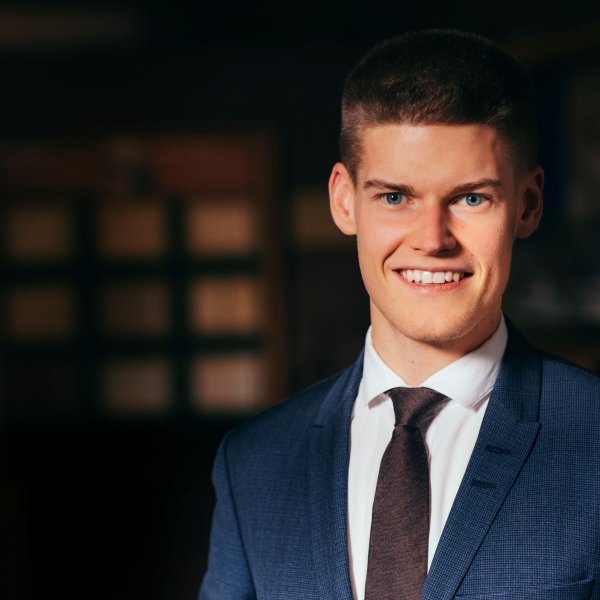How can...
Växjö become the Swedish Silicon Valley?
2019/12/11
We sat down with Deputy Mayor Oliver Rosengren to talk about his vision for our city.
Q: Oliver Rosengren, you’ve previously said that Växjö can become the little Silicon Valley of Sweden. How?
Oliver Rosengren: There are two parts to making Växjö a little Silicon Valley, or Silicon Lake, if you want to use the local version. As a city, we need to be attractive for brilliant minds that want to find new solutions in tech. This means that we must have good infrastructure, functioning welfare, and a good labour market so that people want to move here. Having these fundamental parts working is our main task as the municipality.
The other part is the enterprises’ responsibility. I think creating an environment where tech companies meet and innovate together is hard to force, it just happens. Växjö is already a Swedish centre for modern tech, and you can trace some dots. Back in the day, when the tech giant Boss Media went down, lots of people started their own businesses. Today’s tech scene is somewhat of a heritage of Boss Media. So Växjö has great preconditions for becoming even better.
Q: How important is the tech industry for Växjö’s economy?
The strength of a local economy lies in having some really strong economic areas, as well as having a diversity of areas. Växjö and its surroundings has great traditional industries. We have the forestry sector with Södra, we have Volvo, we have Rottne Industries, and so on. These can be seen as the backbone of our economy. But to stay relevant, we also need to have a modern, interesting, and innovative side of the economy. I’d say that the tech industry has become our modern industry.
Q: Politically speaking, what needs to be done so that the tech sector can further flourish in Växjö?
Starting off with the labour force, the important thing is getting the right competences. Together with Volvo and other companies in the GoTech network, we’re working to get more youths into the industrial and technology programmes in upper secondary school. Over the years, every industry figure asks me the same thing: “How we can get more kids into these programmes?” This year, we’re finally seeing results. It’s the first semester where they completely filled the programme, and even needed to add another class! On the university level, I think one of the best things recently was the introduction of the civil engineering programme at Linnaeus University.
Looking abroad, people need to be able to take their competence, intelligence, and innovative minds and come to Sweden. This is where I think Softwerk should have a medal of honour.
We need to make sure that these people aren’t then forced to leave when they have a job, are contributing, and are needed in their companies.
Q: So how can we remove the obstacles for Växjö’s companies seeking to attract foreign experts?
First of all, I know Softwerk has had some struggles with the Migration Agency in the past and I think you did an excellent work trying to get them to understand. It set a precedent in Växjö.
I’d say that the most important obstacle is the uncertainty. If you’re a company using your resources to attract someone, you want to be sure they’ll be able to stay. Companies are helping a lot with for instance language education, another very good Softwerk example. These companies are really putting their heart into this. But from the government and the authorities, they just face uncertainty. I’m proposing a so-called amnesty for working people. That means that foreigners working here will not be kicked out due to some minor paperwork mistake. If we do this, I believe the companies will solve the rest.
Q: Another part of the solution is to increase IT competences here at home. How can we get more Swedish youths interested in coding?
IT needs to be present in schools the way it’s present in society. But I don’t believe putting an iPad in the hands of every student will do this. Tech needs to be used in an educational way. Why does every student learn how to make a cushion, but not how to program? Why do they all learn how to saw, but not how an application works? We teach traditional crafts, and we should also teach modern craftsmanship, namely programming. I think this should be a mandatory course in elementary school because it’s something everyone needs to understand.
Q: What is the role of Linnaeus University in this?
Overall in Sweden, we’re quite bad at forging connections between research and companies. Also in this regard, Softwerk is a very good example. You’re the exception, since you have that connection with research. I would love to see more companies streaming out from the university. Overall, I want to see more partnerships between the Linnaeus University, schools, and companies.
Q: Deputy Mayor, what’s your pitch to foreign experts thinking about coming to Växjö?
The thing with Växjö is that we never give up, we thrive. These are classical Smålandian values. And if a person is thinking about leaving their country to go somewhere abroad to work, I’d say that sounds like a thriving person. In that regard, I think Växjö would fit very well!


